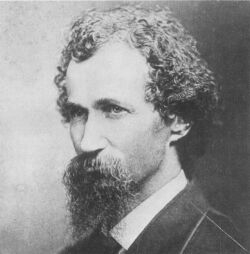Merope
Henry Kendall 1839 (Australia) – 1882 (Sydney)
FAR in the ways of the hyaline wastes—in the face of the splendid
Six of the sisters—the star-dowered sisters ineffably bright,
Merope sitteth, the shadow-like wife of a monarch unfriended
Of Ades—of Orcus, the fierce, the implacable god of the night.
Merope—fugitive Merope! lost to thyself and thy lover,
Cast, like a dream, out of thought, with the moons which have passed into sleep,
What shall avail thee? Alcyone’s tears, or the sight to discover
Of Sisyphus pallid for thee by the blue, bitter lights of the deep—
Pallid, but patient for sorrow? Oh, thou of the fire and the water,
Half with the flame of the sunset, and kin to the streams of the sea,
Hast thou the songs of old times for desire of thy dark-featured daughter,
Sweet with the lips of thy yearning, O Aethra! with tokens of thee—
Songs that would lull her, like kisses forgotten of silence where speech was
Less than the silence that bound it as passion is bound by a ban;
Seeing we know of thee, Mother, we turning and hearing how each was
Wrapt in the other ere Merope faltered and fell for a man?
Mortal she clave to, forgetting her birthright, forgetting the lordlike
Sons of the many-winged Father, and chiefs of the plume and the star,
Therefore, because that her sin was the grief of the grand and the godlike,
Sitteth thy child than a morning-moon bleaker, the faded, and far.
Ringed with the flower-like Six of the Seven, arrayed and anointed
Ever with beautiful pity, she watches, she weeps, and she wanes,
Blind as a flame on the hills of the Winter in hours appointed
For the life of the foam and the thunder—the strength of the imminent rains.
Who hath a portion, Alcyone, like her? Asterope, fairer
Than sunset on snow, and beloved of all brightness, say what is there left
Sadder and paler than Pleione’s daughter, disconsolate bearer
Of trouble that smites like a sword of the gods to the break of the heft?
Demeter, and Dryope, known to the forests, the falls, and the fountains,
Yearly, because of their walking and wailing and wringing of hands,
Are they as one with this woman?—of Hyrie, wild in the mountains,
Breaking her heart in the frosts and the fires of the uttermost lands?
These have their bitterness. This, for Persephone, that for Oechalian
Homes, and the lights of a kindness blown out with the stress of her shame:
One for her child, and one for her sin; but thou above all art an alien,
Girt with the halos that vex thee, and wrapt in a grief beyond name.
Yet sayeth Sisyphus—Sisyphus, stricken and chained of the minioned
Kings of great darkness, and trodden in dust by the feet of the Fates—
“Sweet are the ways of thy watching, and pallid and perished and pinioned,
Moon amongst maidens, I leap for thy love like a god at the gates—
Leap for the dreams of a rose of the heavens, and beat at the portals
Paved with the pain of unsatisfied pleadings for thee and for thine!
But Zeus is immutable Master, and these are the walls the immortals
Build for our sighing, and who may set lips at the lords and repine?
Therefore,” he saith, “I am sick for thee, Merope, faint for the tender
Touch of thy mouth, and the eyes like the lights of an altar to me;
But, lo, thou art far; and thy face is a still and a sorrowful splendour!
And the storm is abroad with the rain on the perilous straits of the sea.”
Font size:
Submitted on May 13, 2011
Modified on March 05, 2023
- 3:02 min read
- 64 Views
Quick analysis:
| Scheme | ABABCDCDCECEFGFGHIHIAJAJCKCKLMLMGNONAPAPQRQGCECE |
|---|---|
| Characters | 3,301 |
| Words | 607 |
| Stanzas | 1 |
| Stanza Lengths | 48 |
Translation
Find a translation for this poem in other languages:
Select another language:
- - Select -
- 简体中文 (Chinese - Simplified)
- 繁體中文 (Chinese - Traditional)
- Español (Spanish)
- Esperanto (Esperanto)
- 日本語 (Japanese)
- Português (Portuguese)
- Deutsch (German)
- العربية (Arabic)
- Français (French)
- Русский (Russian)
- ಕನ್ನಡ (Kannada)
- 한국어 (Korean)
- עברית (Hebrew)
- Gaeilge (Irish)
- Українська (Ukrainian)
- اردو (Urdu)
- Magyar (Hungarian)
- मानक हिन्दी (Hindi)
- Indonesia (Indonesian)
- Italiano (Italian)
- தமிழ் (Tamil)
- Türkçe (Turkish)
- తెలుగు (Telugu)
- ภาษาไทย (Thai)
- Tiếng Việt (Vietnamese)
- Čeština (Czech)
- Polski (Polish)
- Bahasa Indonesia (Indonesian)
- Românește (Romanian)
- Nederlands (Dutch)
- Ελληνικά (Greek)
- Latinum (Latin)
- Svenska (Swedish)
- Dansk (Danish)
- Suomi (Finnish)
- فارسی (Persian)
- ייִדיש (Yiddish)
- հայերեն (Armenian)
- Norsk (Norwegian)
- English (English)
Citation
Use the citation below to add this poem to your bibliography:
Style:MLAChicagoAPA
"Merope" Poetry.com. STANDS4 LLC, 2024. Web. 24 Apr. 2024. <https://www.poetry.com/poem/17529/merope>.



Discuss the poem Merope with the community...
Report Comment
We're doing our best to make sure our content is useful, accurate and safe.
If by any chance you spot an inappropriate comment while navigating through our website please use this form to let us know, and we'll take care of it shortly.
Attachment
You need to be logged in to favorite.
Log In